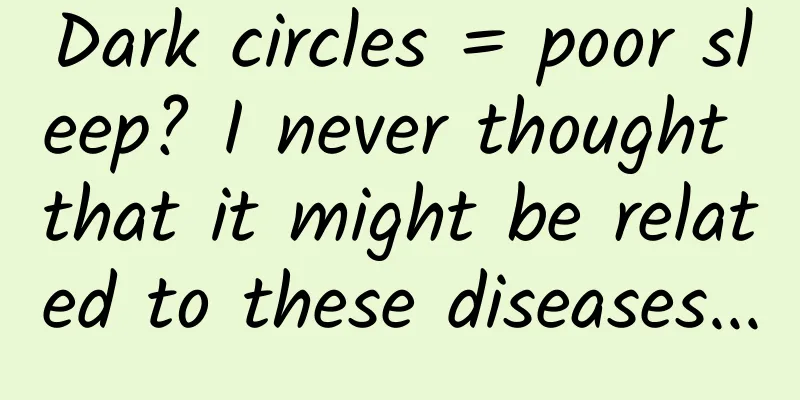Do you have dry eyes and feel tired all the time? Do you know what nutrients are needed to protect your eyes?

|
No. 211 Don't be a muddy world In today's era of highly developed Internet, it is not difficult to find that many people's eyes are suffering from high fatigue and even myopia. Although the lives of our parents were not as colorful as ours now, they did not use their eyes as much as we do. They were either facing computers or mobile phones every day. You might as well think back to your daily life. How much time do you spend looking at various electronic products? Dogs think that if it is not 10-12 hours, it should be at least 8-9 hours. It is the excessive use of eyes every day, coupled with the lack of maintenance, As a result, many people may not have worn glasses during their studies, but their eyesight has deteriorated a lot after they started working. If you want to relieve eye aging, dryness, fatigue, and even prevent some eye diseases, in addition to proper rest, you must learn to give your eyes the nutrition they need. Vitamin A can convert the light received by the retina of the human eye into nerve signals, which are then processed by the brain into visual images, including allowing the human body to see the image of objects in low light. When vitamin A is insufficient, the body's ability to adapt from light to darkness decreases, and the person will feel symptoms of having trouble seeing at night (night blindness). In addition, vitamin A can promote the differentiation of eye tissue, improve and enhance vision, and also plays an important role in maintaining eye function and visual function. Therefore, it is also commonly used to assist in improving and preventing eye diseases such as myopia and eye fatigue, as well as preventing and delaying the occurrence and development of senile cataracts. The food richest in vitamin A is the liver, because it is the storage place of vitamin A in the body. In addition, beta-carotene is a precursor of vitamin A and can be converted into vitamin A in the body. It is mostly found in orange vegetables and fruits such as carrots, spinach, pumpkin, sweet potato, mango, and citrus. Riboflavin, also known as vitamin B2, when the human body is deficient, the eyes will become afraid of light, tear, itchy or burning, and visual fatigue will occur. In addition to riboflavin, B vitamins such as vitamin B6 and pantothenic acid are also helpful in recovering from eye fatigue. Because these vitamins are water-soluble, they cannot be stored in the body and must be continuously obtained from food. It is worth noting that riboflavin has weak alkaline resistance, so try not to cook this type of food together with alkaline foods. Furthermore, because most B vitamins are water-soluble, it is important to control the water content during cooking to avoid the loss of nutrients. Anthocyanin, also known as flower pigment, is a type of flavonoid and has strong antioxidant properties. Anthocyanins, a natural pigment widely found in plants, can not only effectively prevent the protein oxidation of the eye lens, but also effectively prevent the formation of cataracts, prevent and help delay the occurrence of eye diseases such as macular degeneration. In addition, anthocyanins help the regeneration of rhodopsin protein, thereby reducing eye fatigue to a certain extent. This is why anthocyanins are added to many eye protection products. Lutein is a carotenoid with strong antioxidant properties. It will be deposited in the center of the retina and selectively gather in the macular area, protecting the retina's photoreceptor cells at all times like sunglasses. In daily life, blue light damage from sunlight, mobile phones, TV dramas and computer screens is everywhere, so proper supplementation of lutein can protect the eyes and prevent and alleviate some age-related eye diseases. Lutein is an important and necessary pigment that makes up the macula in the retina of the eye. Lutein and zeaxanthin are the only two carotenoids in this tissue. They have antioxidant properties and filter out UV and blue-violet light, protecting your eyes from harmful light. Daily appropriate supplementation of lutein can delay the increase of myopia, help maintain the durability of vision and improve visual reaction time. If you can supplement enough lutein, it can also help the body eliminate free radicals in the body and reduce the damage of free radicals to cells. Reduce the risk of eye diseases such as macular degeneration and cataracts. Finally, let’s summarize the nutrients needed for the eyes. You can get the above nutrients by eating more vegetables, especially dark vegetables, and orange fruits. In addition, dairy products and soy products are also good sources of nutrients needed by the eyes. Of course, if you find it difficult to remember or the effect is not obvious, you can also supplement with some related eye protection nutritional products. References [1] Zhang Baohua, Eye-protecting nutrients make your eyes more beautiful[J] Family Doctor. 2020(2):41 Source: Vitadog Nutritionist |
<<: What health gifts will nutritionists give during the Spring Festival?
>>: The human body staged a palace drama that was even more exciting than the hit TV series!
Recommend
Honda China: Honda China sales in January 2025 were 68,890 units, down 31.8% year-on-year
Recently, Honda China released its January sales ...
Caries, gingivitis... How to treat these 4 dental problems that make you lose your appetite? You will understand after reading this →
Caries, gingivitis, dental trauma and malocclusio...
iOS: How to submit apps to the App Store
The process of submitting a new application is re...
Artificial Intelligence, in a Jar
By Rich Heimann The "brain in a jar" is...
China Anesthesia Week丨The Guardian of "Intoxicating" Beauty: Let's Learn About the Mysterious "Anesthesia Clinic"
The last week of March 2025 is the 9th "Chin...
10 common problems faced by programmers
[[221521]] The most difficult task for programmer...
How can an English novice master Alibaba International Station and build a top 10 store
Learn to master: Learn how to operate Alibaba Int...
Second category e-commerce advertising!
Second-class e-commerce advertising : Tencent adv...
Should you drink less water when you get older? Don’t be fooled again. Lack of water is very harmful to your body. Drinking water this way is healthier!
Myth: "As you age, you should drink less wat...
Windows becomes open source software? Microsoft executives say it's possible
[[131206]] According to InfoWorld, after Microsof...
Major breakthrough! New drug can cure colorectal cancer 100% within 6 months. Will cancer no longer threaten humans?
In recent days, the violent incident at a hot pot...
Train ticket scalpers upgrade their technology: 2G broadband + exhaustive verification code
Today, you can buy train tickets for the last day ...
13 types of cancer actually "prefer" the same type of people! Many people don't care until they get sick
This article was reviewed by Hu Zhongdong, associ...
Don’t ever have this kind of “mindset”!
Author: Gao Shasha, attending physician of Zhengz...
Ximalaya FM Product Experience Analysis Report (Part 2)
As the largest audio platform in China, Himalaya ...









